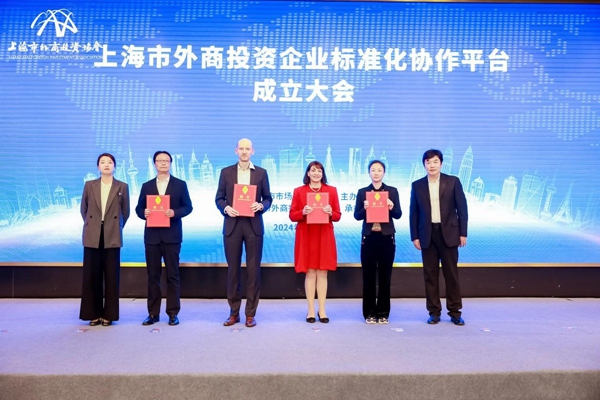Platform launches in Shanghai for foreign-funded enterprises


Representatives from foreign-funded enterprises receive certificates at the inaugural ceremony of the Shanghai Foreign-funded Enterprise Standardization Collaboration Platform on April 11. [Photo provided to chinadaily.com.cn]
The Shanghai Foreign-funded Enterprises Standardization Collaboration Platform was established on April 11, marking the first of its kind in China.
This groundbreaking initiative, unveiled during a press conference by the Shanghai Municipal Administration for Market Regulation, seeks to tackle challenges faced by foreign-funded enterprises. These challenges include navigating unfamiliar standardization policies, understanding participation pathways, and accessing comprehensive standard information.
With the backing of the Shanghai Municipal Administration for Market Regulation, the Shanghai Development and Reform Commission and the Shanghai Commission of Commerce, the platform is meticulously crafted to provide a comprehensive one-stop service to address these pressing needs, as highlighted by the Shanghai market regulator, adding that the Shanghai Foreign Investment Association will serve as the secretariat of the platform.
During the press conference, Wang Yiyang, deputy director of the Shanghai Administration for Market Regulation, underscored the platform's proactive approach and its pivotal role in fostering communication among foreign-funded enterprises and standardization organizations in Shanghai.
Miao Lin, vice-president of Mobility Quality Management & Sales Quality and Warranty for Bosch (China) Investment Ltd, emphasized the crucial role of standards in quality management and innovation. Lin urged for increased participation in standardization organizations and emphasized the need for enhanced collaboration between Chinese and international bodies.
Shanghai, renowned as a major international investment hub, is home to over 70,000 foreign-funded enterprises, contributing to more than a quarter of the city's GDP. In 2023 alone, the city welcomed 6,017 new foreign-funded enterprises, underscoring the escalating demand for standardized practices.
Editors' Picks
 Infographic:
Golden jubilee of China-Brazil relations
Infographic:
Golden jubilee of China-Brazil relations
 Infographic:
A look at China's economy in October 2024
Infographic:
A look at China's economy in October 2024





